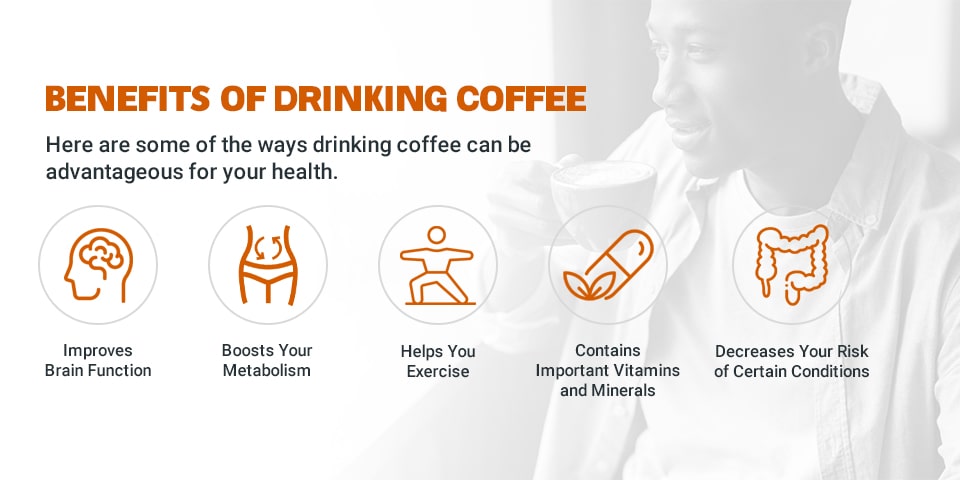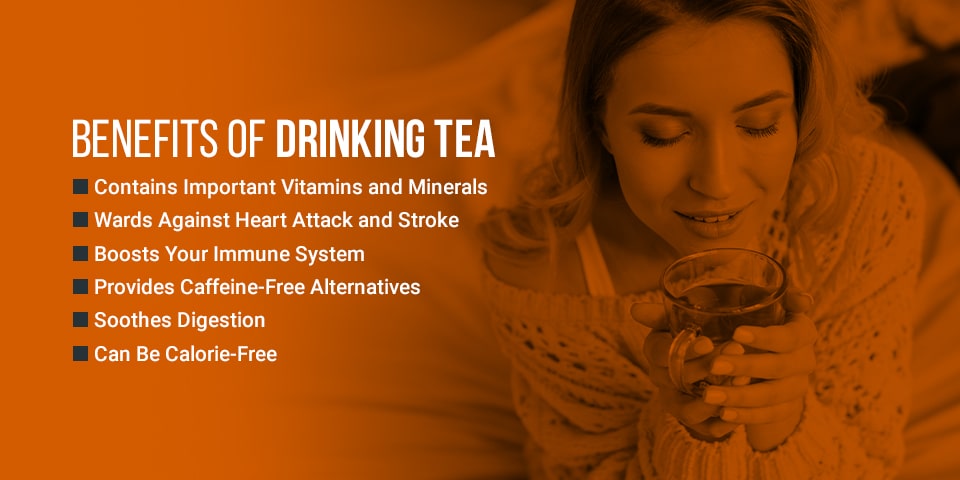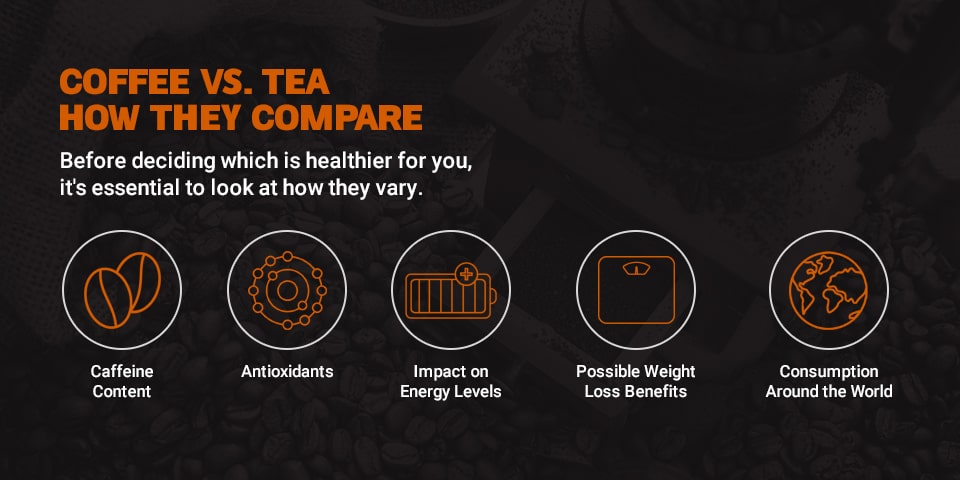Coffee vs. Tea — Which One Is Better for You?
Around the world, millions of people start each day with a hot cup of either coffee or tea. You can find hundreds of flavor variations for both, with coffee beans and tea leaves harvested in various ways globally. Each option offers similar health benefits with some notable variations. Whether you prefer coffee or tea, your morning drink might help you live a healthier, longer life. Let’s take a look at the health benefits of coffee vs. tea.
Benefits of Drinking Coffee
As coffee lovers will attest, the drink offers plenty of potential health benefits due to its caffeine and antioxidant content. Certain additives can make coffee even healthier and tastier. Here are some of the ways drinking coffee can be advantageous for your health.
1. Improves Brain Function
Caffeine, a stimulant, blocks an inhibitory neurotransmitter called adenosine. In other words, caffeine allows more neurons to fire in your brain. It can improve your memory, make you feel happier, quicken your reaction time, and give you energy. Having a cup of coffee can boost your overall brain function, putting you in a better mood and helping you concentrate.
2. Boosts Your Metabolism
Caffeine speeds up your metabolic rate. Metabolization is the process of converting food into energy, and it happens throughout your body. Everyone’s baseline metabolic rate is different, usually slowing as you age. Essentially, speeding up your metabolism can help you lose weight. Aside from drinking coffee, exercising and building muscle mass in your body can have the same effect.
3. Helps You Exercise
Coffee can help you lose weight in indirect ways, as well. As a stimulant, caffeine increases your adrenaline levels. Adrenaline prepares your body for physical exertion — it’s the “flight or fight” chemical. Drinking coffee can give you an energy burst before a workout — but be sure to drink plenty of water. When you exercise, caffeine also signals your cells to break down body fat, helping you get more out of your workout.
4. Contains Important Vitamins and Minerals
Coffee beans contain nutrients like any other plant product. Many of those nutrients make their way into your morning mug. Coffee includes vitamins and minerals such as:
- Vitamin B5, or pantothenic acid
- Vitamin B2, or riboflavin
- Vitamin B3, or magnesium and niacin
- Vitamin B1, or thiamine
- Potassium
- Manganese
5. Decreases Your Risk of Certain Conditions
Drinking coffee in moderation may decrease your risk of certain health conditions, allowing you to live a longer and healthier life.
- Alzheimer’s: Coffee can improve brain function right after drinking, but it also has longer-term effects. Those who consume a few cups of coffee each day are 65% less likely to develop Alzheimer’s in the later stages of their lives. It inhibits the production of proteins that deposit in Alzheimer’s patients’ brains.
- Stroke: Drinking coffee each day is linked to a decreased risk of stroke in adults.
- Heart disease: Because of its antioxidant properties, coffee improves your blood vessel function and can decrease your risk of heart disease.
- Diabetes: Its antioxidants boost your metabolism, helping your body process glucose and utilize insulin, which can help with diabetes risk.
- Gallstones: Having coffee can also make you less likely to develop painful gallstones.
- Colon cancer: Recent research shows drinking coffee can guard against colon cancer.
- Liver cirrhosis: Recent studies have found a dramatic reduction in your risk of developing liver cirrhosis if you drink coffee each day.
Benefits of Drinking Tea
People have been drinking tea for thousands of years. This drink has become ingrained in many cultures worldwide, and for a good reason — it can do wonders for your health. Different types of tea have varying properties, but all kinds offer health benefits. Black and green teas contain caffeine, so they have many of the same benefits as coffee, such as helping you stay energized and focused. Teas with less or no caffeine are ideal for those who are caffeine-sensitive.
Here are some of tea’s many health benefits.
1. Contains Important Vitamins and Minerals
Like coffee, tea contains helpful vitamins and minerals, depending on what type of tea you drink. Different types of tea offer various nutrients, but most black and green teas include:
- Vitamin C
- Vitamin D
- Vitamin K
- Riboflavin
- Calcium
- Magnesium
- Iron
- Zinc
2. Wards Against Heart Attack and Stroke
Drinking tea has a strong link to heart health. Along with other healthy lifestyle choices, drinking tea can help you steer clear of cardiovascular disease, heart attacks, and strokes. Include a few cups of green or matcha tea in your everyday diet for this benefit.
3. Boosts Your Immune System
Drinking tea can make your immune system react quicker. Certain types of tea have been an integral part of natural medicine for centuries, prescribed after an illness or injury. Tea has antibacterial and anti-inflammatory properties that can help you feel better when you’re sick.
4. Provides Caffeine-Free Alternatives
All teas are lower in caffeine than coffee, which is helpful for those who are caffeine-sensitive or trying to reduce their caffeine intake. Herbal teas have no caffeine at all. They’re perfect if you want a warm drink before bed without disrupting your sleeping pattern. Additionally, they’re an ideal coffee replacement for pregnant or nursing women who can’t have caffeine.
5. Soothes Digestion
Certain herbal teas can soothe the digestive system. Chamomile tea is antispasmodic, meaning it can relieve muscle spasms. For that reason, it can decrease the symptoms of irritable bowel syndrome or menstrual cramps. Ginger tea, on the other hand, calms nausea. Drinking a ginger-chamomile blend tea can soothe a disrupted digestive system.
6. Can Be Calorie-Free
If you’re trying to consume fewer calories through beverages, tea is the perfect solution. Although flavorful, unaltered tea has no calories. As long as you’re careful when adding sugar or milk, your tea will be low in calories.
Coffee vs. Tea — How They Compare
While coffee and tea have many qualities in common, they also have several differences. They vary in caffeine and antioxidant content, energy impact, and weight loss effects. Their popularity depends on where you are and who you ask, and each has its own potential downsides. Before deciding which is healthier for you, it’s essential to look at how they vary.
1. Caffeine Content
Coffee tends to have twice the caffeine concentration of an equal amount of black tea. Green tea has less caffeine, and herbal tea has none. While caffeine can make it harder to fall asleep and may intensify anxiety, it also has significant long-term health benefits. The occasional cup of coffee or tea offers you enough caffeine to reap a reduced risk of specific conditions and diseases.
2. Antioxidants in Coffee vs. Tea
“Antioxidant” is a common buzzword in recent food and drink research, but not everyone knows what antioxidants are. In essence, they’re molecules that fight free radicals in your body — free radicals are compounds linked to chronic illnesses like heart disease, diabetes, and even cancer. Antioxidants include both molecules your body generates and the ones it gets from food. Vitamins C and E are examples of antioxidants found in food.
Antioxidant-rich foods can help keep you healthy. Both coffee and tea are excellent antioxidant sources, offering different healthy molecules. Coffee provides a high concentration of chlorogenic acid, which can help lower blood pressure and boost weight loss. Meanwhile, tea contains plant molecules offering a myriad of health benefits.
3. Impact on Energy Levels
Since coffee tends to have more caffeine than tea, its impact on energy levels is stronger. It’s possible that drinking caffeine in your coffee or tea can undermine fatigue and help you reach your physical activity goals. Getting enough exercise is vital for long-term overall health. If drinking caffeine gets you up and moving, it could be good for your body.
4. Possible Weight Loss Benefits
Both coffee and tea seem to have a positive effect on weight loss. The caffeine in coffee or tea can stimulate your metabolism and contribute to a loss in body fat. Since coffee contains more caffeine than tea, its effect on your metabolism is bound to be stronger.
Of course, either beverage has to be incorporated into a healthy diet, which includes being rich in fruit, vegetables, and healthy protein sources. Regular exercise always helps, too. It’s also important not to add too much fat-rich milk or sugar to your morning drink of choice if you hope to lose weight.
5. Consumption Around the World
Starting your day with a hot cup full of caffeine and antioxidants is a widespread practice worldwide. Whether that hot cup is full of tea or coffee, however, depends on where you are. In the Western hemisphere, coffee is more popular than tea. In the Eastern hemisphere, the opposite is true.
Determining which is more popular overall is a bit complicated. While coffee production is almost double tea production, fewer grams of tea are necessary for each cup. Experts estimate that tea consumption outweighs that of coffee by a ratio of three cups to one. This difference might have to do with tea’s lower caffeine content — those looking for a morning burst of energy have to drink greater quantities of tea. It’s also likely related to the higher population densities in Asian countries, where tea originated and is popular.
In the United States, coffee is more popular than tea, and 44% of Americans claimed to drink two or three cups of coffee per day. About 26% claimed to drink one or no cups, while 16% claimed to drink four or five cups. Less than 10% claimed to drink over 5 cups per day. Over half of Americans seem to prefer drip coffee.
Downsides of Coffee and Tea
Both coffee and tea have their potential downsides. It’s important to enjoy both black tea and coffee in moderation, so you can enjoy their health benefits without risking any adverse effects.
1. Too Much Caffeine
It’s essential to remember too much caffeine can do more harm than good. Excessive caffeine ingestion can lead to heartburn and digestive problems. Additionally, drinking caffeine late in the day may cause you to disregard your body’s signals that it needs rest. Over time, disrupted sleeping patterns can contribute to mood disorders. Drinking too much caffeine is a common issue because caffeine is an addictive substance and causes withdrawal symptoms.
Caffeine withdrawal symptoms include:
- Headaches
- Exhaustion
- Confusion
- Irritability
Like other addictive substances, your body can grow tolerant, meaning higher doses are necessary to achieve the same effects. If you’ve developed a caffeine tolerance, a cup of coffee or tea might not energize you as it should. In other words, it’s a good idea to be cautious about how much caffeine you drink and what time of day you drink it. Since coffee is so much higher in caffeine content, it presents a more significant concern.
2. Calcium Loss
Drinking coffee can cause your body to lose calcium. Over time, if you regularly drink a lot of coffee, your body may not have enough calcium to keep your bones strong. Too little calcium can lead to conditions like osteoporosis. As long as you have a calcium-rich diet, you should be able to counteract the calcium-loss effect. Tea, on the other hand, may contain calcium and doesn’t cause calcium deprivation.
3. Dehydration
If you find yourself only reaching for caffeinated drinks like tea and black coffee, you may not be hydrating your body well enough. It’s important to continue drinking water all day long, with other drinks mixed in. Dehydration can cause dry mouth, decreased urination, dry skin, digestional issues, and headaches. Long term, not drinking enough water can lead to a slew of health issues. Be sure to swap your favorite drinks for water from time to time.
Coffee vs. Tea — The Final Verdict
Between coffee and tea, there’s no straightforward winner. Which one is healthier depends on your personal wellness goals. If you’re looking to get a better night’s sleep, you might prefer tea. If you’re looking to burn fat, you might prefer coffee. But if you’re looking to protect your body against illnesses, you could drink either. It all depends on what type of drink you’re after.
Contact Joe’s Garage Coffee
If you’d like to learn more about the tea and coffee industries, reach out to us at Joe’s Garage Coffee. As a private label manufacturer, we’ve produced millions of products, meeting the ever-changing demands of these industries. We develop and package custom coffees and teas with personalized branding. To learn about our products and services — no matter your preference for coffee or tea — contact us at Joe’s Garage Coffee today.














